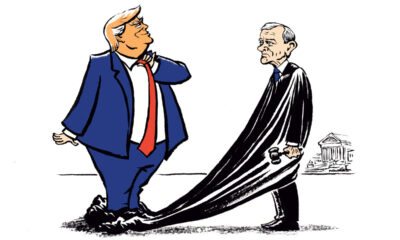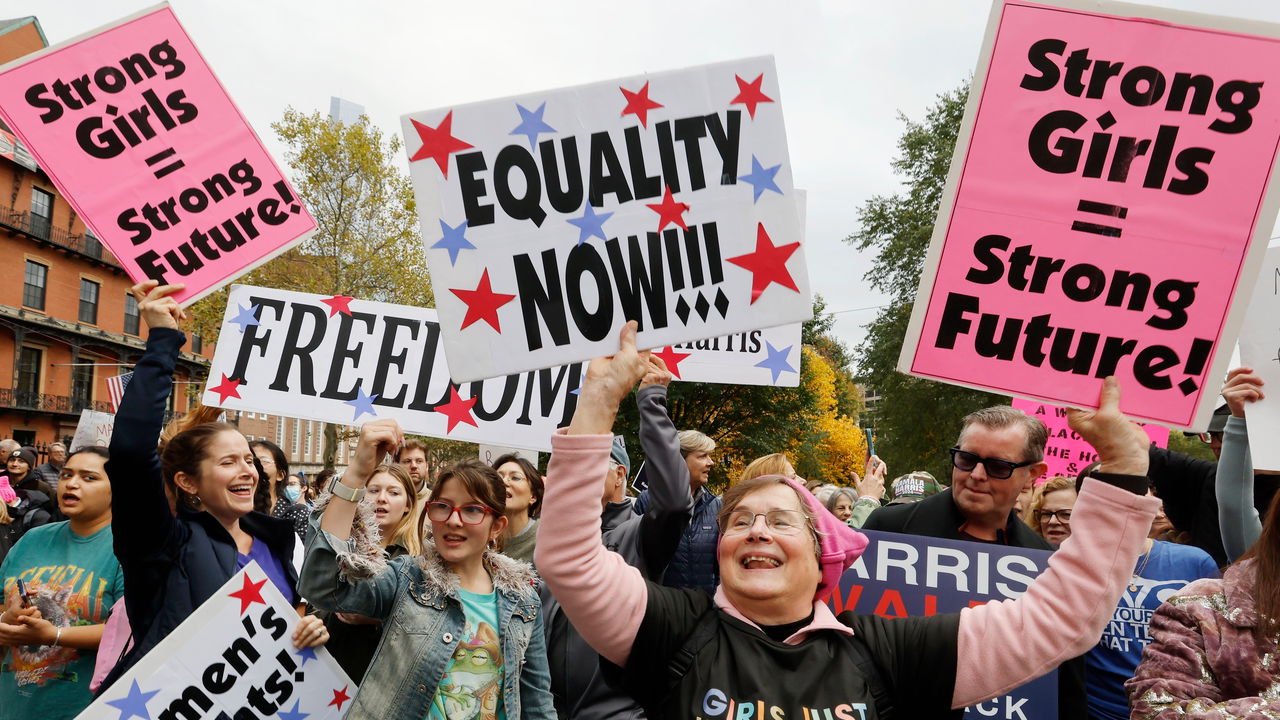AS DEMOCRATS COME to terms with their decisive loss, some have begun pointing fingers at a temptingly simple—and conveniently self-absolving—explanation: it was sexism. America is simply not ready to elect a female president, suggested several news outlets, as it became clear that voters had rejected a woman for the highest office for a second time. In the early hours of November 6th David Axelrod, a campaign strategist turned political commentator, said on CNN that anyone who claimed that sexism did not play a role in Ms Harris’s defeat was simply “wrong”. Patti Solis Doyle, who ran Hillary Clinton’s 2008 campaign, said to Politico that “the country is still sexist and is not ready for a woman president.”
Meanwhile, angry young women have taken to TikTok and other social-media channels to call on each other to emulate South Korea’s feminist 4B movement, which rejects sex and heterosexual dating, in retaliation against young men voting for Mr Trump. “The good news is that men hate us, so there’s no point in catering to them,” starts one video that quickly attracted over 1.3m likes. “No more kitty cat” for men, adds another.
Yet there is little evidence that Ms Harris lost because of sexism, and plenty that she did not. She suffered from structural disadvantages, including her ties to an unpopular presidency and perceptions of a bad economy, that had nothing to do with her sex. While a minority of Americans do hold overtly sexist views, including the idea that men are emotionally better suited for politics, they are clustered in Mr Trump’s base and so were never likely to vote for Ms Harris anyway. And at first glance, those states with a higher prevalence of sexist views (according to metrics devised by economists at the University of Chicago, Northwestern University and National University Singapore) appear to have been no more likely to have swung towards Mr Trump than states with lower levels of sexism.
Research suggests that the electorate, on average, is not influenced by a candidate’s sex when they enter the voting booth. A meta-study, by Susanne Schwarz, now of Swarthmore College, and Alexander Coppock, of Yale, found that some voters (particularly if they are Democrats or women) are slightly more supportive of hypothetical female candidates. And unlike Mrs Clinton, Ms Harris throughout her campaign managed to avoid one of the few things that studies suggest can measurably hurt a female candidate’s chances with male voters: emphasising the historical nature of her candidacy.
None of this is to say that Ms Harris did not face sexist attacks. T-shirts and caps sold at Trump rallies were emblazoned with “F*** Joe and the Hoe” and “Biden Sucks, Kamala Swallows”. A now-deleted ad, by Elon Musk’s PAC, repeatedly called her “a big old c-word”. After she was announced as the Democratic nominee, sexist language online surged, sometimes fuelled by Mr Trump himself. Google searches for Ms Harris with the word “bitch” rocketed, much as they did after Mrs Clinton announced her candidacy.
But gender can be both highly relevant in an election and yet not hurt the chances of a female candidate. One reason for the speculation that sexism influenced the outcome is that this election became seen as a “battle of the sexes”—stoked by comments such as J.D. Vance’s about “childless cat ladies”—and a referendum on women’s rights. Because of this, several analysts predicted that the gender voting gap could reach a new high as women flocked to Ms Harris and men to Mr Trump.
With only exit-poll data to go on, it is too early to draw firm conclusions. But clearly the central Democratic hope of mobilising women in unprecedented numbers did not materialise. According to early estimates, women did not make up a larger share of the voting population than in 2020, and there is little evidence so far to suggest that the gender gap widened. Damningly, there is plenty to suggest that women (at least modestly) pivoted to Mr Trump. Where in 2020 some 55% of women overall voted for Mr Biden, AP VoteCast estimates that in 2024 Harris’s share slipped to 53%.
It appears that one of the few groups with whom Ms Harris gained ground compared with Joe Biden in 2020 were white college-educated women. Her support among black women remained stable even as it slipped among Hispanic women (although a majority still supported her). As in 2020, a majority of white women seem to have voted for Mr Trump. Meanwhile, Mr Trump’s lead among white men appears not to have increased, but he did see meaningful bumps among Hispanic men and young black men.
What came of the Gen Z “gender schism”? In the final stretch of the election, Mr Trump and Ms Harris actively courted young men and young women, respectively. Before November 5th pollsters were divided on how much weight to give to the idea that young men and women were growing apart. This is the generation most likely to say they lie to loved ones about how they vote, so it is hard to know how honest they are with pollsters. The first exit-poll data paint a similarly mixed picture, and it is too early to say whether the youth gender gap widened. Although talk of radicalisation of all young men is overblown—about half still voted for Ms Harris—Mr Trump has been successful in appealing to grievances among large segments of this age group.
What is clear is that the (relatively) young did not save Ms Harris. Quite the opposite. Among the under-45s, according to AP VoteCast, the swing towards Mr Trump was similar among both men and women and much greater than the very marginal shift in the over-45s. Instead, young people are the group who have shifted farthest, regardless of gender or race. This is not the key variable for explaining Trump’s vote, it’s the key variable explaining the swing. For a party that had hoped to count on both a gender- and a youth-quake, that is damning. ■

 Finance6 days ago
Finance6 days ago
 Finance6 days ago
Finance6 days ago
 Personal Finance1 week ago
Personal Finance1 week ago
 Economics1 week ago
Economics1 week ago
 Personal Finance1 week ago
Personal Finance1 week ago
 Economics1 week ago
Economics1 week ago
 Economics1 week ago
Economics1 week ago
 Economics1 week ago
Economics1 week ago










